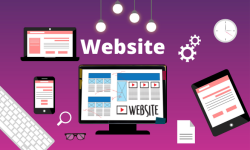The Importance of Building a Website for Your Business
In today’s fast-paced digital world, having a strong online presence is not just a luxury — it’s a necessity. One of the most essential tools for establishing this presence is a business website. Whether you run a small local business or a large multinational company, a professional website is crucial for reaching customers, building trust, and staying competitive in the market.
1. First Impressions Matter
A business website is often the first interaction potential customers have with your brand. Before visiting your physical store or calling your office, they’re likely to look you up online. If your business doesn’t have a website or if your site looks outdated or unprofessional, it can lead to a negative impression.
A well-designed website showcases your brand identity, values, and professionalism. It communicates what your business stands for, what products or services you offer, and how customers can contact you or make a purchase. First impressions matter — and a website ensures yours is a positive one.
2. 24/7 Online Presence
Unlike a physical store that operates during fixed hours, your website is available 24/7. This means customers can access your services or information about your business at any time — day or night. This round-the-clock availability improves customer convenience and increases the likelihood of making sales or conversions, even outside of normal business hours.
For instance, if someone wants to learn about your services at midnight or shop during the weekend, a website makes that possible.
3. Builds Credibility and Trust
In a digital age, consumers expect legitimate businesses to have an online presence. A well-structured and informative website adds credibility to your brand. It shows that you are professional, transparent, and open to engaging with your audience.
Including testimonials, client reviews, certifications, and case studies on your website helps in building trust. It gives potential customers the confidence they need to do business with you.
4. Effective Marketing Tool
A website acts as a central hub for all your digital marketing efforts. You can run social media ads, email marketing campaigns, or Google Ads — but all of them should ideally direct users back to your website for further action.
It also supports search engine optimization (SEO). With good SEO practices, your website can rank higher in search engine results, making it easier for people to find you when they search for services or products related to your business.
5. Cost-Effective and Measurable
Compared to traditional advertising like newspaper ads, billboards, or TV commercials, building and maintaining a website is relatively inexpensive — especially when you consider its long-term benefits. There are website builders like WordPress, Wix, and Shopify that make it easy and affordable for businesses to go online.
Additionally, websites allow you to track user data. Tools like Google Analytics show how many people visited your site, which pages they clicked on, how long they stayed, and more. This data can be used to understand customer behavior and improve your services or marketing efforts.
6. Showcases Products and Services
Your website is the perfect place to showcase your products or services in detail. You can provide descriptions, prices, images, videos, usage guides, and even customer reviews — all of which help consumers make informed buying decisions.
If you're in the service industry, you can list your offerings, highlight your expertise, and allow users to book appointments or consultations online.
7. Enhances Customer Service
Websites can be designed to answer frequently asked questions (FAQs), offer live chat support, provide downloadable resources, or enable customers to contact you through forms or emails. This improves the customer service experience and reduces the time your staff spends on answering repetitive queries.
8. Competitive Advantage
Many businesses still do not have a website or haven’t invested in updating theirs. This gives you an edge over competitors. When potential customers compare two businesses — one with a modern, informative website and the other without one — they’re likely to choose the former.
A website gives you the opportunity to stand out, promote your unique selling points (USPs), and capture a larger share of the market.
9. Scalability and Growth
As your business grows, your website can grow with it. You can start with a few pages and expand over time to include more features like a blog, e-commerce store, client portal, or multi-language support.
This scalability makes websites a future-proof investment for businesses aiming to expand their reach and operations.
Conclusion
A professional website is more than just a digital brochure — it’s a powerful tool that can transform how your business operates, attracts customers, and builds relationships. From improving visibility and credibility to enabling online sales and customer engagement, the benefits of having a website are too significant to ignore.
In a world where most consumers search online before making a decision, not having a website is like not existing at all. If you want to grow your business, build trust, and stay ahead of the competition, investing in a website is one of the smartest moves you can make.
Attachments
Last edited by a moderator:

